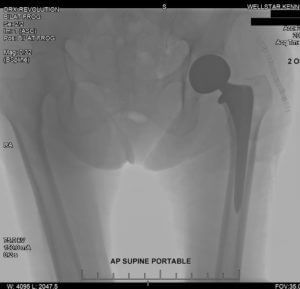Eighty-year-old Carolyn was visiting a restaurant in Marietta, Georgia with her son. She went to the bathroom and slipped and fell in a puddle of water inside the bathroom stall. She broke her hip and required surgery to repair it. When the restaurant denied responsibility for Carolyn’s fall, she came to us for help. After nearly a year of litigation, our attorneys secured a settlement from the restaurant. The settlement amount and name of the restaurant are confidential at the request of the defendant.
CAROLYN’S INJURIES
Carolyn broke her femur in the fall. Doctors determined she needed a hip replacement surgery to repair it. Because of her age, she spent several months after the surgery recovering in a rehabilitation facility. She made a good recovery, but now walks with a cane and is not as active and mobile as she used to be before her injury. Her medical bills from the surgery and rehabilitation were more than $80,000.

PROVING RESPONSIBILITY IN A SLIP AND FALL CASE
To hold a business responsible for a slip and fall case, you have to prove the business knew or should have known about the slip hazard. In this case, we didn’t have any evidence that the restaurant knew about the water on the floor. Instead, we needed to prove that the restaurant should have known about the water.
Georgia law requires businesses and property owners to keep their property reasonably safe for customers. This includes inspecting it for slip and trip hazards. If a business does not have an inspection routine to look for slip and trip hazards, the law says the business has “constructive knowledge” of any hazards. Constructive knowledge means the business should have known about the slip hazard.
The restaurant claimed it inspected the bathrooms every thirty minutes. However, the restaurant did not have any evidence or witnesses to prove it did. We used the restaurant’s lack of an inspection routine to show it should have known about the water on the floor.
Our attorneys found a former employee of the restaurant who cleaned up the bathroom after Carolyn’s fall. He testified that the restaurant’s bathroom cleaning checklist was blank and that the restaurant had not cleaned the bathroom that day. This was more evidence the restaurant did not have an inspection routine in place and should have known about the water on the floor.
RESTAURANT “SPOLIATED” EVIDENCE BY NOT SAVING SURVEILLANCE VIDEO
We determined that the restaurant’s surveillance cameras would have recorded people walking in and out of the bathrooms. The surveillance footage would have been conclusive proof of when restaurant employees inspected and cleaned the bathroom.
However, the restaurant did not save any surveillance video from the day of Carolyn’s fall. It didn’t save any despite the manager immediately investigating the fall, completing an accident report, reporting the fall to the restaurant’s corporate office and reporting a claim to the restaurant’s insurance company.
Under Georgia law, the restaurant’s failure to save the surveillance video is “spoliation of evidence.” This means that a jury can assume the destroyed evidence would be helpful to Carolyn and harmful to the restaurant.
THE SETTLEMENT
We agreed to mediate the case shortly before it went to trial. We reached a settlement that fairly compensates Carolyn for her injuries and the impact they’ve had on her life.

